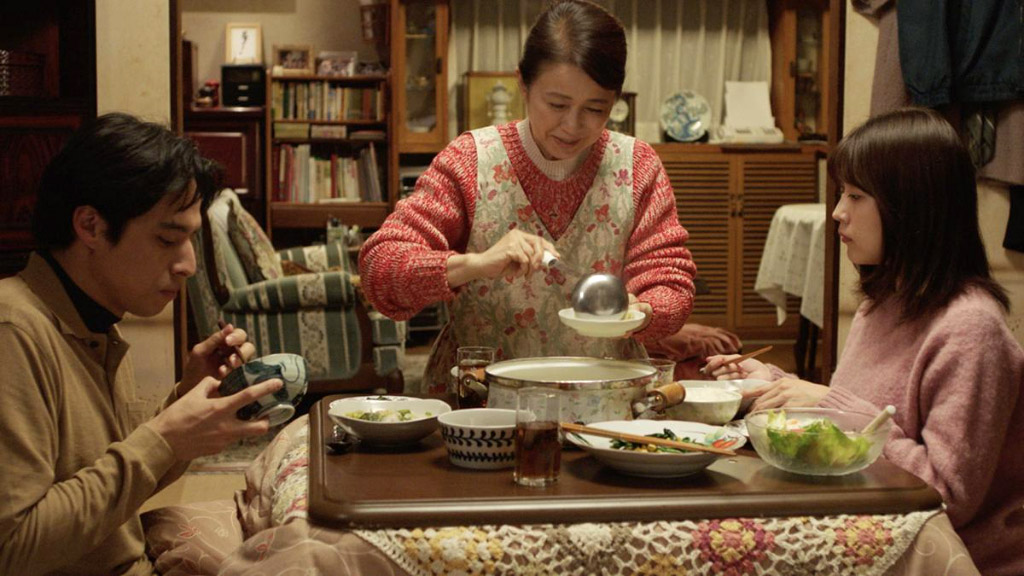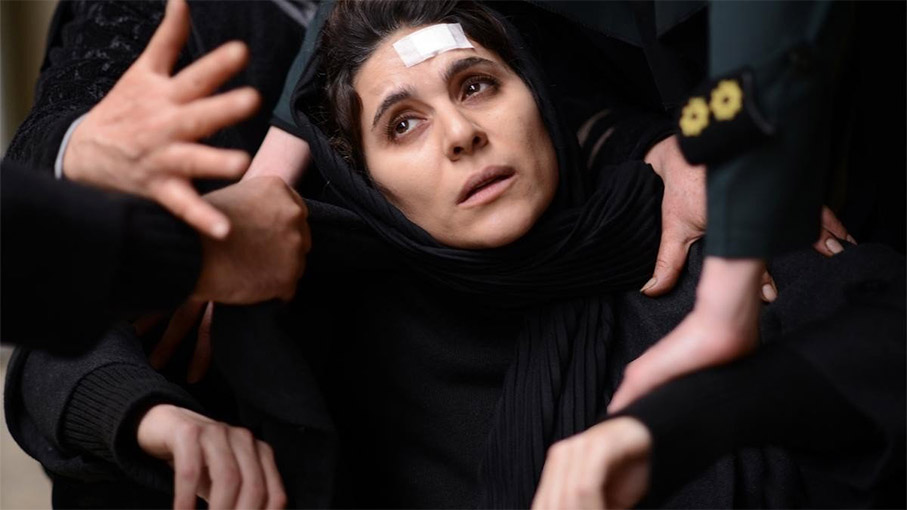|
Although we’ve posted full reviews for four of the films in this year’s BFI London Film Festival, I quickly became aware that I was watching more films than I could hope to write about in my preferred level of detail, so have chosen to cover some as capsule reviews (a couple of which have since grown a little in size…) and post these in collections of three or four titles. This is the first of what is likely to be two or three of such dispatches, and features A Day-Off of Kasumi Arimuya, Farewell Amor, 180º Rule and Bloody Nose, Empty Pockets. The reasons for bringing them together here rather than publishing full reviews do vary and where pertinent have been outlined in the film-specific coverage below.
| A DAY-OFF OF KASUMI ARIMURA |
|
As a long-time fan of the work of celebrated Japanese filmmaker Koreeda Hirokazu, I have been only vaguely aware of his TV work, largely because, unlike his feature films, it just doesn’t get widely shown outside of Japan. It’s perhaps because of this that the organisers of this year’s London Film Festival decided to give us a tantalising taste by screening the first episode of his most recent series, Arimura Kasumi no Satsukyu, or as it has been slightly awkwardly translated, A Day-Off of Kasumi Arimura.

On paper the premise doesn’t exactly sound like the basis for a riveting drama. Actress Arimura Kasumi (as ever, I’ve going with the Japanese convention of family name first, which is how it appears in the original Japanese title) is told that the following day’s filming has been cancelled, and she decides to use this unexpected break in her busy schedule to head out of the city and visit her mother. Probably the most intriguing aspect of this setup is the fact that Arimura Kasumi is not an invention but a real actress with over 50 film and TV credits to her name and here is playing a fictionalised version of herself. It’s a trick we’ve seen before in the likes of Being John Malkovich, I’m Still Here, Zombieland and the TV series Extras and Episodes, but the difference here is that Kasumi is not playing a parody of herself but what appears to be a close approximation of who she really is, and the sort of dramatic conflicts and bizarre behaviour and situations found in the above quoted titles thus have no place here. Kasumi, it turns out, gets on well with her mother, and on being met by her at the Shinkansen station, goes shopping with her and then takes a long walk home with her to cook dinner. Dramatic stuff, huh? Kasumi’s mother (who is played by actress Fubuki Jun, not her real mother) is also proud of her daughter’s fame and makes a point of showing her off to the local supermarket manager, who smilingly gushes on recognising her and assures her that his son is a big fan of her work.
That evening, Kasumi teases her now widowed mother about possible future developments in her love life, then gets a bit of a start when a young man turns up at the door and is warmly welcomed in and moves through the house with the familiarity of someone who has been there many times before. Kasumi looks on with a blend of bemusement and almost disapproving suspicion, and as soon as the man steps outside she wants to know who he is, but is not ready for the answer she receives.
As with so many of Koreeda’s family-centric features, the grip that the story exerts here is one that sneaks up on you rather than grasping you by the throat. As ever, the delight is in the detail, and having visited a fair few Japanese homes by now I recognised so many small details that collectively add to the sense that what we’re watching is closer to reality than it is to performed drama. The gentle pace and absence of loud moments are also both signature elements of this filmmaker’s storytelling style, as is the revelation of family secrets and a willingness on the part of those involved to face up to and process the discovery of them in their own way. It’s a quietly seductive opener that has one small problem for those of us who watched it as part of the London Film Festival – having enjoyed and got rather caught up in this 45-minute opener, I’m rather keen to see what happens next, and for the moment at least that’s simply not an available option.
17 years ago, Walter (Ntare Guma Mbaho Mwine) emigrated to New York from Angola, and now his wife Esther (Zainab Jah) and his teenage daughter Sylvia (Jayme Lawson) have finally been permitted to fly to America to join him. They quickly make a home in Walter’s small apartment and set about getting to know each other again after so long apart. They night, however, when the devoutly Christian Esther offers herself to Walter as their marriage traditions dictate, she is a little surprised by his seemingly awkward suggestion that they take things slowly, unaware that her husband has for some time been having a relationship with the younger and more outgoing Linda (Nana Mensah).

That premise alone is the basis for an all-too pertinent commentary on the damage to families and relationships that can be inflicted by the forced separation that immigration rules can impose, and Farewell Amor does well by it, never overstating a message that it allows us instead to slowly absorb over the course of the drama. A quartet of winningly naturalistic performances help, as does Sahr Ngauja’s effectively low-key direction, but what really makes the film more than just a drama of circumstance is its time-shifting and character-specific take on the traditional three-act structure. A clue comes at the start with a title card bearing Walter’s name, and only about a third of the way in, when a second one featuring Sylvia’s name appeared did it dawn on my that we’d been seeing things primarily from Walter’s viewpoint. In the second and third acts events are viewed instead through the eyes of Sylvia and Esther respectively, but the timelines in each unfold at different speeds – the family’s first few days together occupy a sizeable portion of Walter’s story but are skipped through in Esther’s to focus more on her adjustment, her beliefs and her relationship with her now distantly located sister.
Like the last act of the similarly structured Lawless Heart, the final segment is devoted in part to humanising the lead character with whom we may initially be the least sympathetic – I do realise I’m saying that as someone who finds devoutly religious and judgemental people annoying by default – and just who you empathise with the most may depend very much on your experience, your beliefs, and even to a certain degree your gender. Their time apart has certainly impacted on all three family members. Walter has found love elsewhere, Esther has sought solace in religion, and Sylvia appears to relish the prospect of escaping from the restrictions of her mother’s faith that the move to America offers. This is expressed most directly through her love of dance, something Esther disapproves of but Walter quietly encourages as an expression of the self. It’s a claim that he later makes good on when he takes Esther to a restaurant and encourages her to join him and dance to music that is mere background noise to the other diners, an invitation she initially resists but eventually accepts and unexpectedly enjoys. Ultimately, the one I felt the most sorry for is Linda, who having been in a relationship with Walter for some time is put on the back burner so that he can dutifully focus on his family, and then has this unintentionally rubbed in her face when Walter takes Sylvia to the hospital at which she is the attending medic.
The film does have a sprinkling of formula moments, including a climactic dance-off that pits Sylvia against a bossy rival, but for the most part Farewell Amor is a gently paced and keenly observed character-led study of how the bonds of family can be tested by forced separation. It’s a timely message for a country in which the children of immigrants fleeing war and crippling poverty are being taken from their parents by government agencies with no thought for the welfare of the afflicted parties. When so many seem so ready to dismiss the plight suffering of whole families and in their minds somehow categorise them as lesser beings because they weren’t born on the same bit of turf as them, we need films like this, ones that put a recognisable and warmly sympathetic human face to those at the sharp end of hatemongering headlines and right-wing political ladder climbing.
In modern-day Tehran, respected schoolteacher Sara (Sahar Dolatshahi) wants to attend the wedding of a relative in Northern Iran, but in this still fiercely patriarchal society she requires the permission of her husband Hamed (Pejman Jamshidi) to do so, and he flatly forbids her to go. As he will be out of the city for work and will thus be none the wiser, she decides to go anyway, but something happens while she is away that has the potential to turn her husband destructively against her, so instead of coming clean she invents a covering story, an ill-thought-through plan that quickly starts to unravel.

To get into detail about the film’s damning indictment of the country’s patriarchy requires revealing the specifics of the above hinted-at mid-film plot twist, which at this stage I don’t think it would be remotely fair to do. Usually when I get into spoiler territory to discuss subsequent plot developments I do so with a warning and the advice to see the film first and only read on once you have done so, but as far as I know, 180º Rule has yet to secure a UK release, which rather knocks that option on the head for the immediate future. I’ll thus save my views on the effectiveness or otherwise of the film’s tempestuous second half until such a time as it can be more widely seen.
I will say that I’ve read some surprisingly negative comments about this film, not full-on hostile but the dismissive “I’ve seen better” variety, some of which focus on the second half emotional outburst of the characters. These are definitely more pronounced than usual for an Iranian film, with weeping, pleading and furious anger all on show here, the latter at one point boiling over into an attempted physical assault. It’s this that has led to suggestions that the film is shouting a message about the punishing nature of the country’s patriarchy that previous Iranian films have delivered with more subtlety and I do get that. But I’d also argue (and forgive my vagueness but I’m trying to dodge around potential spoilers here) that the situation in which the characters find themselves is one that probably would trigger the sort of extreme emotional outbursts that seem to have so irked some detractors. The issue of whether Sara would make up the story she does and convince her immediate relatives to go along with it is another matter and the credibility of this aspect has been called into question by some, with one commentator pertinently wondering if this is a fictional tale or one based on a true story, which I do think would make a difference. There’s also a sequence at the wedding that unfortunately telegraphs the big plot twist to come, not explicitly but because it employs a storytelling technique that’s been around in movies for a good few years now, and when you’ve seen it enough times then its use here can’t help but set alarm bells ringing.
I’d still argue that 180º Rule (a reference to a filmmaking dictum that is also referred to as “not crossing the line,” which has genuine relevance to the situation here) is an impressively confident first feature, and the mere fact that the story is told from a female perspective (writer-director Farnoosh Samadi) makes it seem likely that the anger at the film’s inequalities of Iranian society is born from personal experience. The performances are consistently strong throughout, particularly Sahar Dolatshahi, who even when at her most expressive always keeps Sara grounded in reality. It’s a film that cries out for a second viewing, and should it secure a UK release is one that I will definitely be revisiting – maybe then I can talk in more detail about a key aspect of the film that is best experienced unforewarned.
| BLOODY NOSE, EMPTY POCKETS |
|
I’ll admit that I’m new to the work of filmmaking brothers Bill and Turner Ross, and the intriguingly titled Bloody Nose, Empty Pockets proved to be a seductive introduction. It is, however, one that gave me – as it has some others – considerable pause for thought, not about the subject matter or any viewpoints expressed within it, but the nature of the documentary format that the film employs. On the surface what we have here is ripe subject matter for documentation, being a record of the final night of a Las Vegas dive bar named The Roaring 20s. It was filmed on the day after Donald Trump’s election, when the closure of a much-loved establishment becomes symbolic of the end of an era, a final shout for community and comradeship before both are sabotaged by the politically driven societal divisions that were set to follow.
As you would expect, the film lives through its characters, many of whom make an instant and engaging impression. There’s the big-bearded owner who serenades his customers with Roy Orbison’s Crying and takes a phone call from a patron who wonders where his drink is; an ageing booze-hound whom you suspect spends some nights sleeping it off in the bar but still takes time to shave and freshen up in the morning; a vet who becomes lost in his thoughts but dances through the room to Michael Jackson; a flirty 61-year-old woman who pulls up her top to show off breasts she is still proud of; a thirty-something dick who dismisses the older generation and at one point tries to pick a fight with a man twice his age; an Australian who wants to whip off his trousers to get comfortable (“What kind of party is it if an Australian guy doesn’t take his pants off?”); a sassy night bar manager whose self-confidence and quick wits see her snappily fend off drunken chat-ups and break up a potential fight with the ease of someone who was born to do this job.

The Ross brothers wander through this lively throng and settle on moments, exchanges and even confrontations that although are some ways specific to the country in which the establishment is located, in others are typical of lively bars anywhere once the drink starts flowing – anyone who has spent time in such an establishment will likely let slip at least a couple of smiles of fond recognition. Given the night on which it was recorded, there is a surprising (and perhaps refreshing, given the number we’ve witnessed and even been part of since) paucity of political debate, but in a moment that has since proved fifty per cent prophetic, one customer claims that the newly elected Trump will either be assassinated or impeached.
There’s just one thing, The Roaring 20s didn’t actually exist. The establishment in which the film was shot is still open and is located in New Orleans rather than Las Vegas, and the regulars aren’t regulars at all but New Orleans locals selected by the Ross brothers and asked to intermingle for the evening and pretend that they were attending the closing night of their favourite bar. So does that make Bloody Nose, Empty Pockets a documentary or a drama or a hybrid of both? And given that the participants were asked to improvise around a given situation, how much of what we see of them is who they really are and how much is down to them performing for the camera? And if the situation was set up by the filmmakers, just how much direction did they give their carefully chosen participants? These questions were certainly on the lips of some of those who saw the film when it screened at Sundance, where complaints were made about its inclusion in the festival’s documentary category, and this difficulty of categorisation is something I found myself repeatedly pondering on as I watched the film. Of course, despite the idealistic notion that documentary is truth (go watch the opening scene of John Sayles’ Lianna to see that myth wittily punctured), this ignores the fact that the very techniques employed here date back to the genre’s origins and Robert Flaherty’s Nanook of the North, a then-revelatory portrait of an Innuit family whose participants were not related at all but individually selected by Flaherty for their photogenic qualities, while specific scenes and elements were manufactured for the camera.
Times have changed, of course, and the technique of fly-on-the-wall observational filmmaking has come to be seen as so synonymous with factual filmmaking that it became an essential component of the mockumentary format and the ‘it really happened’ element of the found footage genre, two sub-genres that dress up fictional tales in faux-factual clothing. Indeed, the film that is credited with first popularising the found footage genre, The Blair Witch Project, has foundational similarities to Bloody Nose, Empty Pockets, with its newcomer cast put into a created situation and encouraged to improvise around plot developments passed to them in note form by the directors as the story unfolded. The difference here is that the various characters that visit and run the bar certainly appear to be playing true versions of themselves, something that the steady consumption of alcohol doubtless helped to facilitate. In a sense the patrons and staff alike are archetypes, no doubt chosen in part for that quality and so that they register so quickly as individuals and readily reveal things about themselves because they are conversing with people whose background and lifestyle differs from their own. On that level the film is a hugely engaging and entertaining social experiment, one that encouragingly suggests that it is possible to put our differences aside and actually get along if we just hang out in a bar and talk to each other. Oh, if only.
|